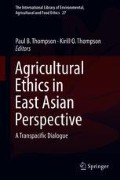Abstract
The major differences between the patterns of ancient Chinese and Western ecological thought are: Ancient Chinese ecological thought was an articulation of the intimations of natural instinct as intermediary for defining ecological thinking and behavior, unlike the notion of a direct ecological sensibility invoked in the West. And the ancient Chinese approach of expressing their “sensitivity” and “uses” of the natural ecology differed from Western approaches, especially in conduct of agriculture; because ancient Chinese ecological thought involved extending natural instincts to humanity independently, thus forming China’s culture-specific ecological humanity. The ancient Chinese approach involves important instinctive and values for the contemporary development of ecological ethics and working to solve the agricultural problems of today.
Access this chapter
Tax calculation will be finalised at checkout
Purchases are for personal use only
References
Ban-gu. 1963. Book of Han. Beijing: Zhonghua Book Company.
Cheng, Changming. 2004. Exegesis, Book of rites. Hohhot: Yuanfang Press.
Committee of Thirteen Classics. 1992. Annotation of the thirteen classics. Beijing: Peking University Press.
Guan-Zhong. 2010. In Guanxius, ed. Xiaojuan Yao and Yinfeng Wang. Zhengzhou: Zhongzhou Ancient Book Press.
Guo, Qingfan, ed. 1961. Annotation of Zhuang-tse. Beijing: Zhonghua Book Company.
Guo-Yu. 2006. Exegesis, Book of changes. Beijing: Zhonghua Book Company.
He-Ning. 1998. Exegesis of Huainan Tse. Beijing: Zhonghua Book Company.
Knoblock, John. 2002. Xuncius. Palo Alto: Stanford University Press.
Kong, Yingda. 2004. In The real meaning of the book of changes, ed. Peide Yu. Beijing: Jiuzhou Press.
Lao-tse. 1997. The spring and autumn period. In The Dao Teh King. Trans. Arthur Walley. Beijing: Foreign Language Teaching and Research Press.
Legge, James, Trans. 1891. The sacred texts of China: The texts of Taoism. Oxford: The Clarendon Press. See also http://vdisk.weibo.com/s/dorgOJRebQY5y.
———, Trans. 2014. The works of Mencius. Shanghai: SDX Joint Publishing Company.
Li, Jingde, ed. 2013. Analects of Zhu-xi. Beijing: Zhonghua Book Company.
Lü, Buwei. 1999. In Lu’s commentaries of history, ed. Lu-Ming-Ren. Taiyuan: Shanxi Publishing Group.
Su-Yu, and Zhong-Zhe, eds. 1992. The demonstration of the spring and autumn. Beijing: Zhonghua Book Company.
Tse-si. 2010. The doctrine of the mean. Trans. J. Legge. Beijing: Foreign Language Teaching and Research Press.
Yang, Jilin. 2002. Exegesis, new explanation of scripture of great peace. Shijiazhuang: Hebei People’s Publishing.
Zhang, Wenyu. 2000. Annotation of Yizhou Shu. Guiyang: Guizhou Publishing Group.
Zhang, Zongyou. 2010. Exegesis, Zuo’s biography of the spring and autumn annals. Zhengzhou: Zhongzhou Ancient Book Press.
Zhi, Weicheng, ed. 2013. Comprehensive explanation of Mocius. Beijing: Intellectual Property Publishing House Co., Ltd.
Zhu, Jieren, et al., eds. 2002. Zhu-xi’s books. Vol. 23. Shanghai: Shanghai Ancient Books House.
Zhuangzi. 1999. The Essential Zhuang-tse. Trans. A. Hamill, & J.P. Seaton. Boston: Shambhala Publications
Author information
Authors and Affiliations
Editor information
Editors and Affiliations
Rights and permissions
Copyright information
© 2018 Springer International Publishing AG, part of Springer Nature
About this chapter
Cite this chapter
Xu, H. (2018). Analysis of the Relationship Between Eco-humanity in Ancient China and Its Conduct of Agriculture. In: Thompson, P., Thompson, K. (eds) Agricultural Ethics in East Asian Perspective. The International Library of Environmental, Agricultural and Food Ethics, vol 27. Springer, Cham. https://doi.org/10.1007/978-3-319-92603-2_6
Download citation
DOI: https://doi.org/10.1007/978-3-319-92603-2_6
Published:
Publisher Name: Springer, Cham
Print ISBN: 978-3-319-92602-5
Online ISBN: 978-3-319-92603-2
eBook Packages: Religion and PhilosophyPhilosophy and Religion (R0)

